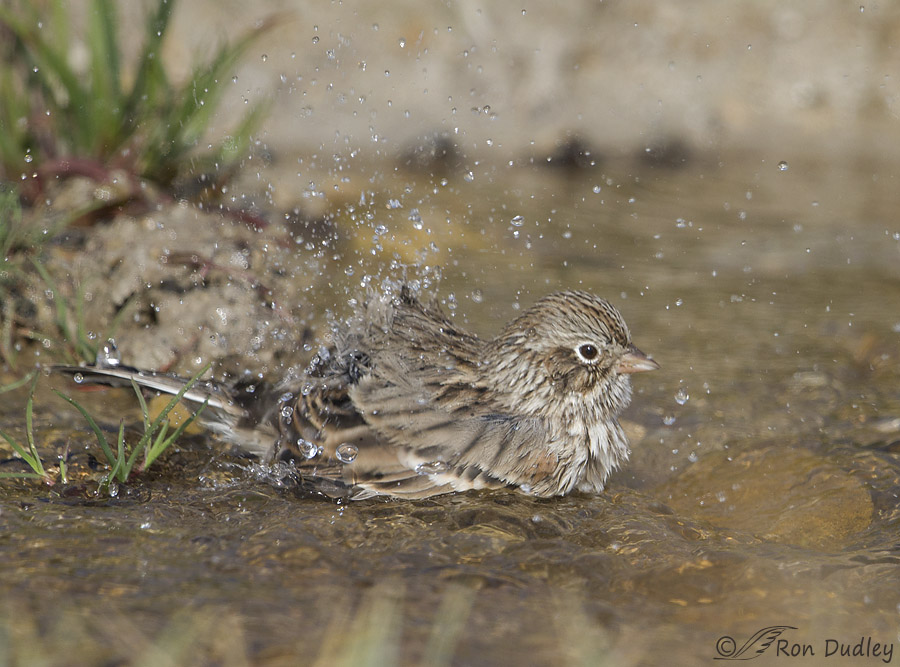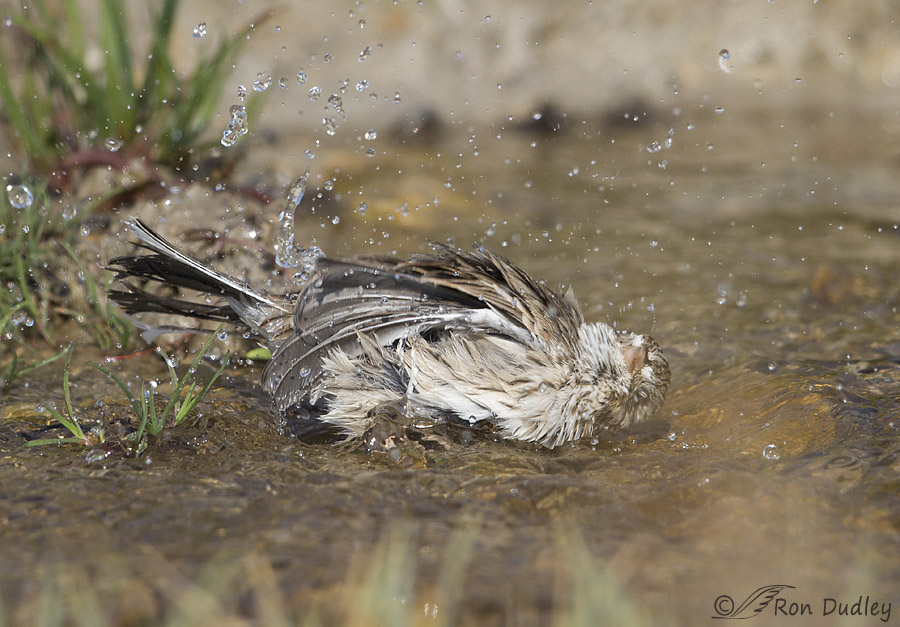This post is an update on an event and a process that began when I photographed this Vesper Sparrow as it bathed in a small Montana spring earlier this fall.

1/2500, f/5.6, ISO 640, Canon 7D, Canon EF500mm f/4L IS II USM +1.4 tc, not baited, set up or called in
The sparrow was an enthusiastic bather and it certainly wasn’t shy about it as it dipped and shook in the water for some time with my pickup just a few feet away.

1/2500, f/5.6, ISO 640, Canon 7D, Canon EF500mm f/4L IS II USM +1.4 tc, not baited, set up or called in
In fact this was one of the longest and most energetic bird baths I’ve witnessed from a songbird.
I had no idea I’d photographed anything unusual until 3 weeks later when I was preparing a blog post on the bathing episode. As I often do I did a little research on the species and the behavior while I was preparing the post and I noticed that Birds of North America Online (BNA) out of Cornell (a source I highly respect for its detailed accounts of bird natural history) said that Vesper Sparrows often take dust baths but are “not observed to bathe in water”.
This made me wonder if I might possibly have observed something new so I made a mental note to send BNA a link to my post in case they might be interested in updating their Vesper Sparrow account regarding bathing. In the meantime I had been corresponding with Myrah Bridwell, Permissions Coordinator for Cornell’s Handbook of Bird Biology, on another matter and in the “conversation” I mentioned to her what I’d photographed and sent her a link to the post which she forwarded to Alan Poole, Editor of BNA Online, saying that I’d “documented a previously undocumented behavior”.
To make a long story slightly shorter I happened to check BNA’s Vesper Sparrow account yesterday morning and it has been edited. What used to say “not observed to bathe in water” now says “also known to bathe in water (pers. comm. Ron Dudley; images and written account)” and includes a link to my original Bathing Vesper Sparrow post.
I really deserve no particular credit other than being lucky and observant. As a science teacher for 33 years before I retired I spent my entire career teaching my students about the scientific knowledge gleaned by others and this is one of the few times I’ve ever contributed anything original to that body of knowledge. As small as my contribution might be it still gives me a significant amount of personal satisfaction.
Part of the reason for this post is to encourage others to take note of the little things you observe in the field and if you see something interesting that might be new, document and report it. Somewhere. And BNA Online would be an excellent starting place. BNA is a pay site that requires a membership fee ($42/year) to access their bird accounts but in my opinion that fee is a bargain if you’re heavily into birds.
Besides, you don’t have to be a member to report interesting (documented!) observations or provide feedback to BNA. Several links/email addresses can be found here.
Ron
PS: No, I haven’t received my new camera yet. Now it’s looking like it won’t arrive until Monday. Sigh….


Congratulations on your keen eye and for sending in your observations to the site. I am grateful for Mia’s and your mention of the Cornell site, as I have gone to the site frequently. And it is such a cute photo with much energy and drops frozen still with the shutter speed..
oh AWENESSS!!! So cute!!!!
Congratulations! I’m not a bit surprised but your photos are truly outstanding to commemorate the event!
Charlotte
That’s very cool to get mentioned and linked.
They are just slow learners. I have been learning from you for as long as I have followed your posts. Careful observation you have – and also the generosity to share your observations.
And, on a person note, my showers of later have been every bit as blissful as that sparrows… The joy of ablutions is sadly underestimated…
“The joy of ablutions is sadly underestimated…”
I agree, Elephant’s Child. For me it HAS to be a shower, not a bath. I don’t believe I’ve actually bathed in about 30 years (more than you wanted to know, I’m sure…)
Congratulations! Being observant goes hand in hand with being a photographer. I’m married to a photographer.
It certainly does, Karen (and you ought to know!).
Dear Ron,
Congratulations on your observations of the bathing Vesper Sparrow and your contributions to the body of knowledge. I must have missed your comments on getting a new camera. Congratulations on that, too!
Thank you, Debbie.
The account of my new camera drama can be found here:
https://www.featheredphotography.com/blog/2014/10/31/downy-woodpecker-and-a-personal-horror-story-for-halloween/
Good work, Ron! Life is in the details, as they say. I really enjoy and learn from your careful observations.
Thanks very much, Deborah.
Awesome account of what you witnessed. Also very impressive photos. 500mm with 1.4 tc at f5.6, your focus was spot on as this would be a very narrow depth of field. Great job.
Thanks, Dan. It also helped that the sparrow was turned sideways to me.
Sharing is Caring……
That’s true, Bill.
Ron, those of us who know continue to share our knowledge, teach, throughout our lives.
Thanks.
I think you’re generally right, Diana. Thank you.
Once again, you taught me something new!!! I thought all sparrows bath in water. I have dozens of sparrows in my yard. They are pests here. They all bath in my bird bath. And, just in passing, I have been seeing one flying in and out of one of my blue bird boxes like she’s building a nest. It’s November. Great pictures Ron. And you so deserve the recognition!!!
Thank you, Ellen. I saw a pair of Mallards mating just last week. Kind of blew me away…
I love these pictures, especially the second one. You have an amazing ability to capture the personalities of the birds you photograph, and these shots are a good example.
A comment about biologists: I’m grateful to my high school biology teacher for cementing what was then an unrealized interest. As long as there is anything to observe in nature, it’s hard for an old biologist to wither on the vine – there’s just too much of interest out there, too many things to learn. I am finding that my interests are expanding, to the point where I’m starting to become interested in snakes. And I thought interest in lizards was strange…
Susan, Your comment reminded me of an incident involving my own biology teacher when I was a sophomore in high school. I’m not proud of my role in it but I’m going to relate it anyway to show that one never knows what the lesson to be learned might be.
I wasn’t a particularly good student in high school because I almost never studied (parties and girls were more important…) but when a family friend (Kathy Owen) became my student teacher in biology I decided to actually study and try “for her”. I missed an “A” by two points (out of many hundreds) for that quarter but I just assumed that she’d give me the A anyway because I was so close and we were friends. She didn’t – she stuck to her guns and I got a B+. I was angry and in “retaliation” I stopped studying and my grades in that class naturally dropped after that.
Boy, I sure showed her, didn’t I?
But as I (finally) matured a little I realized that she had done me a favor. After that, clear through college, I made sure I had some “wiggle room” for the grades I was shooting for and never again assumed that “close” was good enough – in class and in life.
I used to tell that story to my own students to try to make the point with them before they paid the price instead of after. I think it made a difference with at least some of them and they knew to never argue about a grade just because they were “close”. Thank you Kathy Owen for the valuable lesson, well-taught and well- learned.
Oh, golly that water feels so good, and I sure hope it gets rid of the itch those mites have been making!!!
Absolutely great shots Ron!!
As a retired science teacher myself, Biology, Environmental Science, Oceanography, I couldn’t agree more! Also as a bander, I would take students into the field banding on weekends. Felt students needed to get outside the classroom more then they do today. Had a fantastic time as a teacher, observer and citizen science contributor and am still doing it! Christmas Bird Counts are a citizen science project for a day, and it doesn’t cost anything, just time!
Many thanks for all your hard and enjoyable work and the fact that you are willing to share it with us.
“Had a fantastic time as a teacher, observer and citizen science contributor and am still doing it!”
I loved reading that part of your comment in particular, Dick. I’m sure the enthusiasm you have now you also had in the classroom. That enthusiasm is contagious with students and we need all of that we can get in the classroom.
Besides, at this stage in our lives it helps to keep us old timers from withering on the vine…
I agree Ron, but I don’t think most teachers wither, they just show it in different ways! There are several retired teachers and college professors here in this community, and they are all involved in one thing or another. I just don’t see as many individuals as I would like to see get involved in nature. There are some here, and especially here in Vermont, but too many young people are hiding behind their X-box, I-phone, etc. I think it makes it very difficult when you have conservation, ecological and wildlife issues when the populace as a whole are too involved in their urban world. We need these young people to be involved.
Sorry, I get drawn into these things, but I refuse to be pessimistic!
Dick, I think you and I are alike in many, many ways but I’ve noticed one difference. I’m naturally a pessimist (Mia makes fun of me for it – she’s the eternal optimist, Pollyanna personified). I think the reason I’m the way I am is because I innately would rather be pleasantly surprised than disappointed…
OK, Truth be told – my outward persona is an optimist, my inward persona, before now only my family was aware of this, is pessimistic! My wife, Cindy, and family, say Oh, there goes dad again!
If you are not careful I may just get in my truck and trudge out to Utah!!
That would be a treat, Dick!
My partner (who makes an art form from it) tells me that pessimists can never be disappointed – just pleasantly surprised.